#Delaware industries
Explore tagged Tumblr posts
Text
How Life Sciences Technology Companies Are Shaping Tomorrow’s Solutions
In a world where science and technology increasingly intersect with healthcare, life sciences technology companies are leading a quiet revolution. These innovators are not only improving how we detect, treat, and prevent diseases—they're transforming how we think about wellness, diagnostics, and even the future of medicine.
From biotechnology firms creating groundbreaking therapies to data-driven platforms supporting personalized healthcare, the life sciences sector is filled with energy, innovation, and endless potential. As part of a broader movement among STEM-based industries, these companies drive economic growth, research breakthroughs, and real-world solutions that affect people everywhere.

Life Sciences and Technology: A Dynamic Partnership
Life sciences have long referred to biology, medicine, genetics, and studying living organisms. But in the 21st century, technology has supercharged that definition. Now, it includes artificial intelligence, machine learning, cloud computing, and data analytics—all applied to solve some of the world's biggest health challenges.
Life sciences technology companies sit at this intersection. They develop software that helps researchers process vast amounts of genetic data, create wearable devices that track patients' vital signs in real time, build robotic systems that assist in surgical precision, or automate pharmaceutical manufacturing.
This fusion of science and tech is not just exciting—it's essential. With rising global health concerns, an aging population, and a constant need for drug discovery and disease management innovation, life sciences companies are more vital than ever.
Where Life Sciences Thrive
Life sciences companies cluster in regions with a strong support ecosystem. Think of access to universities, medical centers, government grants, and a talented workforce trained in science, tech, and engineering. Unsurprisingly, many STEM-based industries thrive in innovation hubs like Boston, San Diego, and the Bay Area—and increasingly, states like Delaware, Maryland, and North Carolina.
These locations provide more than just infrastructure. They offer the opportunity to collaborate with hospitals, startups, universities, and public health departments. This interconnected environment accelerates research and underscores the power of teamwork and shared knowledge in driving innovation.
Impact on Everyday Lives
While some of the work happening in life sciences labs may feel far removed from daily life, the impact is closer than many realize. Much stems from this sector: a new cancer therapy, a COVID-19 vaccine developed with messenger RNA technology, or even a digital tool that helps manage chronic illness from home.
Life sciences companies are also improving diagnostics, making it easier to catch diseases earlier and treat them more effectively. This means better patient outcomes, lower healthcare costs, and improved quality of life for millions.
The Road Ahead
Looking to the future, the role of life sciences technology companies will only continue to expand. Artificial intelligence is being used to identify new drug candidates in record time. Predictive analytics is helping healthcare providers make more informed decisions. Gene editing technologies like CRISPR also open new possibilities for treating genetic disorders.
This sector is so exciting because it doesn't just innovate for innovation's sake—it does so with a purpose. The goal is to improve lives, extend lifespans, and reduce suffering. That mission attracts top talent, significant investment, and the continued attention of governments and academic institutions.
As we move deeper into a future defined by precision medicine, smart devices, and global health challenges, the role of life sciences technology companies is more crucial than ever. These companies are at the forefront of Delaware's STEM-based industries, developing as sophisticated solutions as they are life-changing.
Whether you're a researcher, investor, policymaker, or simply someone interested in where healthcare is headed, keeping an eye on the life sciences sector is essential. It's here where science meets compassion, and innovation meets impact.
0 notes
Text
Unveiling the Key Industries Shaping Delaware’s Future
Delaware, often celebrated for its tax-friendly environment and strategic location, houses a diverse economic landscape that has evolved over the years. Understanding the key industries propelling the state's economy provides insights into its economic resilience and potential for growth. Let's delve into the vital sectors shaping the economic tapestry of the First State.

Finance and Banking
Delaware is a financial powerhouse, home to numerous national and international financial institutions. The state's status as the legal home for many corporations, coupled with its favorable corporate laws, has led to the concentration of banking and financial services. The resourceful page on Live Love Delaware highlights the significance of this sector in providing job opportunities and contributing substantially to the state's revenue.
Healthcare and Life Sciences
The healthcare and life sciences industry is a cornerstone of Delaware's economy, fostering innovation and providing essential services. The state hosts prominent healthcare institutions, research facilities, and pharmaceutical businesses, contributing to advancements in medical science. The sector's impact on employment and its role in positioning Delaware as a hub for healthcare excellence is emphasized in the provided resource.
Agriculture
Agriculture has deep roots in Delaware's history and is a pivotal industry. The state's fertile land supports various crops, poultry farms, and dairy production. As highlighted in the referenced page, the agricultural sector sustains local communities and plays a crucial role in the broader food supply chain.
Technology and Innovation
Delaware has embraced technological innovation, fostering a dynamic environment for tech-based industries. The state's commitment to supporting startups and technological advancements is showcased in the provided resource. The technology sector drives economic growth and positions Delaware as a player in the global innovation landscape.
Manufacturing
Manufacturing remains a key player in Delaware's economic landscape. The state has a robust manufacturing sector produces a diverse range of goods. The resource underscores the significance of manufacturing in providing opportunities for employment and contributing to the state's Gross Domestic Product (GDP).
Delaware's economic resilience and Delaware industries are a result of the harmonious interplay of these critical industries. As showcased in the provided resource, each sector contributes uniquely to the state's prosperity, making Delaware a compelling destination for businesses and residents. Understanding and appreciating the diverse economic landscape can gain valuable insights into the forces driving Delaware's growth and shaping its future.
0 notes
Text

RES Logistical provides expert hydro vac services across Delaware, specializing in safe, non-destructive excavation for industrial, municipal, and commercial needs. Based in Oxford, PA, RES combines advanced equipment with a commitment to safety and environmental responsibility.
#reslogistical#industrial hydro vac services delaware de#environmental waste disposal services new york ny
0 notes
Text
"A recent court ruling from the Inter-American Court of Human Rights marks the first time an international judicial body has decided that indigenous peoples living in “voluntary isolation” have a right to do so, and that governments must act to ensure that right.
The ruling comes off the back of 20 years of activism challenging the Ecuadorian government’s encroachment on indigenous lands for oil drilling, and this, as well as other extractive activities like logging, were ruled to be intolerably disruptive to three groups living in voluntary isolation in the Ecuadorian Amazon.
International treaties protecting the rights of indigenous peoples have long been ratified at both the UN and the Organization of American States (OAS), but a case specifically determining whether a group living in voluntary isolation, which used to be called “uncontacted,” were guaranteed protection to allow them to continue doing so has never been ruled on.
While the United Nations Human Rights Council in 2009 and the Inter-American Commission on Human Rights in 2013 introduced guidelines and recommendations that included a right to choose self-isolation, neither were put into writing under international law, nor included in any treaty amendments.
As such, the Costa Rica-based court’s decision that nation-states, in this case Ecuador, must follow a “precautionary principle” when making decisions about future oil operations that may impede a group’s ability to live in self-isolation.
“This principle means that, even in the absence of scientific certainty regarding oil exploration and exploitation projects’ impacts on this territory, effective measures must be adopted to prevent serious or irreversible damage, which in this case would be the contact of these isolated populations,” said the court opinion, written in Spanish, and translated by Inside Climate News.
The three groups in question are the Tagaeri, Taromenane, and Dugakaeri, who are part of the overall Waorani peoples since they share cultural traditions and language.
Testimony was heard from a community leader of the Waorani, Penti Baihua, and two young women who at the ages of 2 and 6 were survivors of violent encroachment by oil workers who killed members of the girls’ group, forcibly introduced them to modernity, and displaced them to different parts of the Amazon.
In the current case, the court ruled that a protected area the size of Delaware that was established in the early 2000s to guarantee indigenous Waorani (and others) rights was created in such a way as to leave oil exploration areas outside protection, despite being the ancestral home of Baihua and his people.
A 6-mile deep buffer zone surrounding the heart of the Tagaeri, Taromenane, and Dugakaeri’s territory called the “Intangible Zone,” has been repeatedly penetrated by extractive industries, which have built roads and other “colonial” infrastructure.
The court ruled that Ecuador must honor the results of a 2023 referendum, in which voters chose to stop oil operations in that region indefinitely.
The court used the term “living in voluntary isolation” to reflect that fact that there are no unconctacted tribes on Earth, but perhaps as many as 200 who have seen evidence of modernity, and received minimal contact—perhaps from a related tribe that doesn’t live in isolation—and chose to remain without any interaction with the modern world either out of fear or self-interest."
-via March 28, 2025
#indigenous#ecuador#south america#waorani#voluntary isolation#indigenous rights#indigenous people#environmental justice#oil#oil drilling#colonialism#amazon#amazon rainforest#amazonian peoples#good news#hope
2K notes
·
View notes
Text

Unfortunately this is an answer that would have you fail 3rd grade state standard us history and geography test. Maryland is Southern AND Mid-Atlantic because of its strong mercantile and cultural ties to the middle colonies but historical practice of plantation slavery which ties it to the South. It is not New England, which was historically characterized by Puritanism and full industrialization. After the Civil War, parts of the upper south such as Maryland, Delaware, and arguably Northern Virginia a century later culturally identify much more with the midatlantic than the South. Famous Marylanders include Frederick Douglass, Harriet Tubman, and Thurgood Marshall.
133 notes
·
View notes
Text
A Speech For the Colonist.
It is my opinion that communist movements within the US fail because they refuse to address decolonization.
It is my further opinion that the contradiction between colonizer and colonized supercedes the contradiction of class. The Native American Nations are colonized, Black people are colonized, Hispanic people are colonized. Colonization is the key to white supremacy and white supremacy is the key to class within the United States and Canada.
If you talk to most white communists about decolonization within the United States you'll get things like, "Well, decolonization will come with the revolution because we'll give the people the autonomy and resources they need to care for their communities." This is the exact same rhetoric that alienated black revolutionaries from the American Communist Party in the 60s. "Under communism every worker will have what he needs and be able to give according to his means, so we don't need to worry about race."
Comrade, we do. We do need to worry about race. We cannot simply wish a reality away because in our minds Everyone Will Be White in a communist society.
We need to acknowledge the fact that every single White Person within the United States, and the rest of the Americas for that matter, is a colonist. Our institutions are colonial. Our industry is colonial. Our cities are colonial. Our infrastructure is colonial. Our lawns are colonial. Every single aspect of our lives has its roots in colonization.
We still plunder the earth like we're sending silver and timber back to England and Spain.
By pretending that we are not colonists we make it impossible to address the ways in which we colonize. By ignoring the ways in which we colonize we fail to address the ways in which we are imperialist. By failing to address our imperialism we fail address capitalism.
We are colonists. Pretending that this isn't the case doesn't make it any less reality.
You'll acknowledge the fact that we live on stolen land but would you hand Seattle back to the Duwamish? Would you cede Delaware back to the Lenape? Would you take up arms, and then lay them down to a nation of people that are unlike you? Would you take up arms and lay them down again for a nation of people that you might not agree with politically? Have you confronted your fear that they would treat you just like we treat them?
For that matter, how have you addressed your conception of Black Nationalism? Any white communist will tell you that Nationalism as a concept is counter-revolutionary but how do you address the fact that there is an entire race of people who were ripped from their homes and forced to colonize another land? The solution certainly isn't Liberia, which is itself a colonial exercise.
How do you address the fact that any black person will tell you that a nation created for and by black americans would be a pretty good deal in their book? How do address the fact that our colonial nation isn't their nation and they know it? What do you do? Do you call them reactionary? Do you tell them that their desire for a home of their own is because we orphaned their ancestors and that they need to get over it?
Comrade, these are the questions you need to answer. You need to listen to the people we have colonized and you need to really observe our material conditions.
We live with the unique situation that, as a result of a vicious and often ignored genocide, the colonizers are the majority ethnic group within the colonized land. White people make up 57% of this country. And unlike other colonized regions, there's no France for us to return to. There's no England, there's no Belgium, there's no Netherlands, there's no Spain. The working class white is stuck here. It's up to us to address our own reality and to understand that, ultimately, no way and no how can we be the face of revolution within the united states.
No white led communist movement will prosper because, even now, we still have too much to lose. Our people will never start the fight as we are now. Understand that.
#This isn't the completed speech#Which I am writing as homework for my Rhetoric class#but it encapsulates a lot of the ideas I want to address#Colonization#Decolonization#Communism
221 notes
·
View notes
Text
WRITEBLR INTRO xx
hey, all! i’m n.k. :-)
i'm not new to tumblr (have had a few diff accounts since 2011/2012), but i'm new to interacting with writeblr proper.
ABOUT ME
late 20s
black & queer & disabled
lifelong writer/musician/creative (in both professional and hobbyist capacities)
finally finishing my degree in creative writing & english!
ARTISTIC/THEMATIC INTERESTS
literary fiction, horror, camp, kitsch, diversity, introspection, family/friend bonds (especially nontraditional ones), romance, art rock, nostalgia, technology, diy ethos
GOALS
connect with the tumblr writing community at large! for a while i was unable to get excited about my non-work, non-fanfic related writing projects. over the past year or so, my passion’s been renewed, and i just wanna chatter with like-minded folks about my longform WIPs, my short stories, etc – and geek over other people’s work here too <3
WIPS
Dagmar
there’s always something going down in dagmar, an insular coastal community straddling the delaware bay. pragmatic tech geek zeke omezie-fumudoh, 18, prefers to keep her head in her books and projects – deaths and disappearances were common in her parents’ home country, too, after all. when her best friend dodie dies, however, zeke has no choice but to start trying to connect the dots & face the potential supernatural forces at play.
[this is finna be dark fantasy/horror, romance, mystery, and queer as hell! i got a lot of worldbuilding to do, but a few months ago the twist popped into my head 1st and i’ve been working backwards. i'm sooo excited abt figuring out the narrative path(s) i gotta take]
Dave & The Family Davenport
20-year-old twin musicians dorian & daria davenport are a little s club 7, a little sly stone, & a whole lotta spitfire. as the very first act signed to holliday records, 30-something producer & label founder dave levine considers it his duty to take the family davenport under his wing. they become his pet project – and eventually something more to him.
[i’m taking this one in a literary/drama direction! thinking found family and music industry commentary vibes. idea came from revisiting big time rush and thinking ‘what would happen if you mix btr + the carpenters + prince + mtv’s making the band??’ (for the record, dave is 100% NOT meant to be a p. d*ddy analogue re: making the band, i'm mainly thinking of the aesthetics of the young artists of color featured on the show)]
Several fun essays about my personal fandom/shipping history (one is about all the diff sites i've used over 17+ years of reading/writing fanfic, another is an old-school livejournal-style ship manifesto that i plan to make into a video! etc etc)
SHORT FICTION
blank [literary/drama, 300 wds]
fortune teller [literary/drama, 300 wds]
hothouse [horror, 500 wds]
a certain standard of care [horror-comedy/surreal/gross-out, 1k wds]
good bones (or, an exercise in letting go) [literary/dramedy, 1.3k wds]
[writing tag: scorpio the scribe]
hmu if you think we'd get along <3 i need more ppl to follow!
[ETA: i prefer to follow/be mutuals w/ ppl 18+ only, ty!]
#writeblr#writeblr intro#writing community#i was gonna add a banner but i'm too lazy to edit one rn lol#writing#ocs#original fiction#writers on tumblr#wips
126 notes
·
View notes
Text
Things the back of my brain believes without my conscious involvement:
- The American accent is an affectation of the podcast industry, like the specific cadence radio DJs talk in
- Rats and goblins are denizens of the Sewer ecosystem
- Delaware is a city
- I can't go to Connecticut because Aslan says I am too old :(
13 notes
·
View notes
Text
Exploring the Major Industries in Delaware
Delaware, often referred to as "The First State," is not just known for its historical significance as one of the original 13 colonies but also for its vibrant economy and diverse range of major industries. Despite its small size, Delaware boasts a robust economic landscape driven by critical sectors that have shaped its identity and contributed significantly to its prosperity. In this article, let's examine the significant industries that fuel Delaware's economy.

Financial Services
Delaware is renowned as a financial hub with a thriving banking sector. The state has many national and international banks, including JPMorgan Chase, Capital One, and HSBC. The friendly corporate tax environment, business-friendly laws, and the presence of the Delaware Court of Chancery, known for its expertise in business law, have made Delaware an attractive destination for corporations to incorporate. This has led to the state housing a significant number of corporate headquarters.
Pharmaceuticals and Biotechnology
Delaware has a burgeoning pharmaceutical and biotechnology sector. Leading companies in Delaware like AstraZeneca and Incyte Corporation have their headquarters or significant operations in the state. AstraZeneca, for example, focuses on research and development in cardiovascular, metabolic, and respiratory diseases. This sector contributes to research, innovation, and employment opportunities in the life sciences.
Agriculture
Agriculture, particularly poultry production, is a significant industry in Delaware. The state is known for its poultry farms and processing facilities. Companies like Perdue Farms and Mountaire Farms have a strong presence in Delaware. These companies contribute to the state's economy and play a vital role in the nation's poultry production.
Healthcare and Life Sciences
Delaware's healthcare sector is robust, with hospitals, clinics, and research institutions serving the state's residents. ChristianaCare Health System is one of the largest employers in the state, providing a wide range of medical services. The presence of institutions like the Nemours/Alfred I. duPont Hospital for Children highlights Delaware's commitment to healthcare excellence.
Technology and Information Technology
Delaware has seen growth in the technology and information technology sectors. Companies like SevOne, headquartered in Newark, specialize in network performance monitoring and management. Delaware's strategic location on the East Coast has positioned it as a favorable location for technology companies.
Education and Research
Delaware's universities and research institutions are vital to the state's economy. The University of Delaware, for instance, is known for its research contributions and educational programs. The presence of these institutions fosters innovation and provides skilled professionals to various industries.
Tourism and Hospitality
Delaware's beautiful beaches, historic sites, and recreational activities make tourism an important industry. The state attracts visitors seeking relaxation and cultural experiences. Rehoboth Beach, Dewey Beach, and Wilmington are popular destinations. The tourism sector contributes to employment and economic growth.
Delaware's economic landscape is marked by its diversity and resilience. Despite its small size, the state hosts a range of significant industries that play pivotal roles in its economic growth and development. Delaware continues to thrive and adapt to the changing economic landscape from financial services to pharmaceuticals, agriculture to technology. Its strategic location on the East Coast, business-friendly environment, and commitment to innovation ensure that "The First State" remains a dynamic and prosperous place to live and do business.
0 notes
Text
Why the World Chooses Business & Financial Services: Key Benefits Driving Global Demand
Business and financial services are foundational in the global economy, facilitating investment, innovation, and industry growth. From banking to consulting, accounting to asset management, these services support businesses and individuals in managing assets. It drives growth and adapting to an ever-changing market landscape.

Expertise in Risk Management and Compliance
One of the most critical functions of financial services is managing risk. Businesses face various risks, such as regulatory shifts, market volatility, and cybersecurity threats. Financial and consulting firms provide expertise to help businesses navigate these uncertainties and ensure compliance with laws and regulations. This guidance enables organizations to focus on growth with the confidence that they’re protected against potential liabilities.
Access to Capital and Investment Opportunities
Financial institutions connect businesses with capital, enabling them to grow, innovate, and expand into new markets. Investment banking, venture capital, and private equity provide access to funding, and stock markets allow companies to raise public capital—these funding options fuel entrepreneurship and innovation, promoting economic growth across sectors and geographies.
Efficient Transaction and Payment Solutions
Business and financial services enable seamless transactions, both locally and globally. Payment processors, credit card companies, and banks provide secure and efficient ways to conduct business. Technological advancements have made digital payments faster and safer, allowing businesses to operate smoothly and expand into international markets without the friction of traditional currency exchange or payment processing barriers.
Informed Decision-Making Through Data and Analytics
Businesses look to financial services for insights that guide strategy in a data-driven world. Financial analysts and business consultants provide critical data and market analysis, helping organizations make informed decisions. From stock trends to consumer behavior, these insights enable businesses to capitalize on opportunities and respond quickly to market changes.
Support for Sustainable Business Practices
As companies worldwide work to adopt sustainable practices, financial services provide the capital and guidance to make it possible. Many financial institutions now offer green bonds, sustainable investment options, and environmental consulting services that help companies transition to more sustainable operations. This shift aligns with regulatory trends and meets the growing demand from investors and consumers for environmentally responsible business practices.
Adaptability to Technological Advancements
The financial services industry has embraced technology, from AI in wealth management to blockchain in transaction security. This adaptability makes business and financial services industries leaders in digital transformation, allowing companies to improve efficiency, reduce costs, and enhance customer experience. Fintech innovations have created a more accessible and democratized financial landscape, benefiting large institutions and individual consumers.
Strong Global Network and Industry Expertise
The interconnected global network of business and financial service providers ensures that companies can access specialized expertise regardless of location. Many global firms rely on financial services for cross-border transactions, compliance with international regulations, and global growth strategies. These networks allow businesses to operate internationally efficiently, driving growth in new markets and facilitating global partnerships.
The world turns to business and financial services for stability, growth, and innovation. From providing capital and risk management to offering cutting-edge technology and sustainability options, these key industries in Delaware are vital to the progress of businesses and individuals alike.
As economies evolve, business and financial services will play a central role in fostering resilience, growth, and global collaboration.
0 notes
Text
Industrial Hydro Vac Services in New Jersey, NJ
Providing top-tier industrial Hydro Vac Services New Jersey NJ. Specializing in safe, efficient waste removal, excavation, and cleaning using cutting-edge technology for superior results.
#industrial Hydro Vac Services New Jersey NJ#industrial hydro vac services delaware de#environmental waste disposal services new york ny#industrial hydro vac services new york ny#industrial hydro vac services maryland md#industrial hydro vac services pennsylvania pa
1 note
·
View note
Text
Horseshoe Crabs



Name: Horseshoe Crab
Scientific Name: Limulus polyphemus
Family: Limulidae
Location: "Although spawning as been observed as far north as Augustine Beach, in Delaware and Alder Cove in New Jersey, prime spawning beaches within the Delaware Bay consist of sand beaches between the Maurice River and the Cape May Canal in N.J. and between Bowers Beach and Lewes in DE."
Status: Vunerable
Fun Facts:
• Horseshoe crabs actually aren't crabs! They're more closely related to spiders, tics, and scorpions.
• They have existed for at least 445 million years; they've remained mostly unchanged throughout it all, prompting some to call them 'Living Fossils'.
• They have blue blood which contains LAL, a very important substance used for sterilisation in the medical industries. If you've ever been vaccinated, thank a horseshoe crab!!

Sources: 🌊 / 🌊 / 🌊 / 🌊
#Sea Creature of the Week#marine biology#marine life#ocean#ocean creatures#ocean life#sea creatures#sea critters#sea life#horseshoe crab
15 notes
·
View notes
Text
So, this administration has killed a program that returns tax revenue at the rate of 10-1 up to 17-1 to the cost of the program. Even as it says it wants to bring manufacturing back. But this program helps small businesses most. Might that be why? They don't want programs that don't help their corporate overlords?
8 notes
·
View notes
Text
Dandelion News - September 1-7
Like these weekly compilations? Tip me at $kaybarr1735 or check out my new(ly repurposed) Patreon!
1. Rescue Dog Who Helped Raise Dozens of Foster Puppies Finds Forever Home

“Three and a half years ago, Noel arrived at Lucky Dog as a pregnant pooch pulled from [an] animal control shelter. […] Once the puppies were old enough to start life on their own, Lucky Dog found homes for all of them. […] Noel was an "amazing mom" to over two dozen foster puppies while staying at [a foster] house.”
2. Radiant cooling device uses significantly less energy than traditional air conditioning

“Testing of the device […] showed the cooling device capable of cooling the skin by approximately 7.3°C. It also showed that it consumed 50.4% less energy than an average air-conditioner of comparable ability. The research team notes that the device can also be run in reverse, to serve as a radiant heater.”
3. How a Native elections official is breaking down voting barriers in Arizona
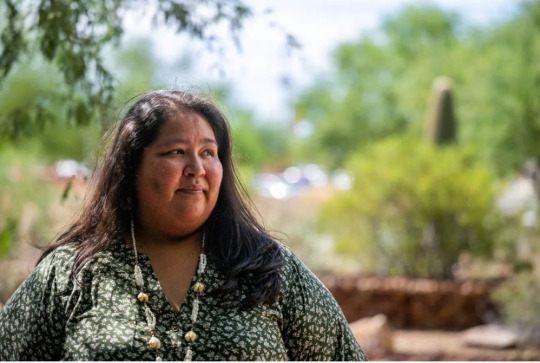
“Gabriella Cázares-Kelly, Pima County Recorder, [… ran for office in 2020] to represent people who were being ignored by the democratic system and denied the right to vote. […] “People started getting the voter registration cards back, getting their voter IDs in the mail, and they were so excited to show me or thank me for helping them register,” she said.”
4. Scientists are growing [coral] babies in a lab to save animals from extinction
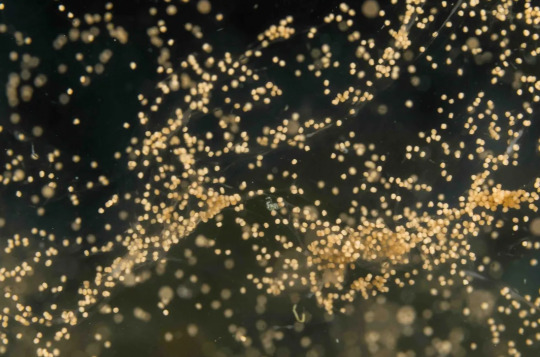
“Each August, corals in Florida release their eggs and sperm into the water[, … but “they] can’t reproduce on their own anymore.” [So, researchers are] collecting and freezing the spawn and growing them into genetically diverse baby corals that can be replanted into the wild[….] These resilient corals could pass important adaptations to their babies[….]”
5. New Legislation Will Accelerate Offshore Wind Energy in Delaware

““The responsible development of offshore wind and the transition to renewable energy is essential for the protection of wildlife, habitats, and communities from the havoc of climate change[….]” “This legislation is the product of careful consideration and input from multiple state agencies, industry experts, energy researchers and environmental advocates[….]””
6. Removal of Apache Trout from Endangered Species List Due to Collaborative Conservation Efforts
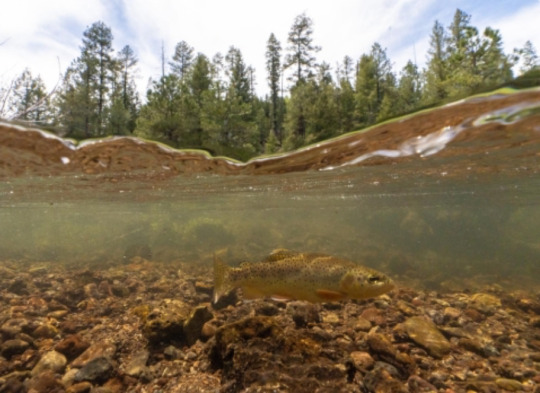
“[A]fter more than five decades of recovery efforts by federal, state and Tribal partners, […] the restoration of Arizona’s state fish marks the first […] trout delisted due to recovery, a significant conservation success[….] The Apache trout is found exclusively in streams of the White Mountains in the eastern part of Arizona […] and is sacred to the White Mountain Apache Tribe.”
7. [Texas] State court rules Austin must release files on police complaint

“Under the act, records of any complaint – even if no disciplinary action was taken – must be handed over to the civilian-led Office of Police Oversight. [… T]he ruling ushers in a new level of oversight of the complaint process and the department writ-large.”
8. Super-rare hairy-nosed wombat caught waddling through a woodland in Australia
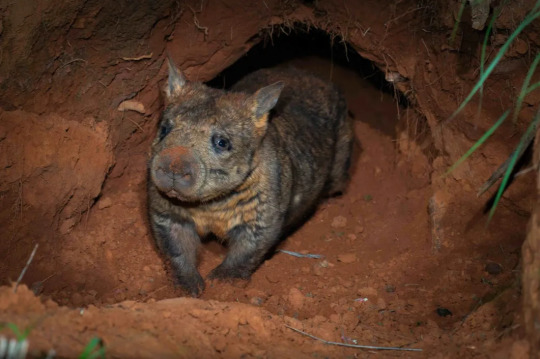
“Ecologists at Australian Wildlife Conservancy (AWC) say the video footage provides exciting evidence wombats are breeding in the refuge again. […] There are only 400 of them in the world, making them rarer than the giant panda and the Sumatran tiger. […] “Although this isn’t the first joey born at the refuge, it is the first juvenile spotted for a few years.””
9. The country’s biggest electric school-bus fleet will also feed the grid
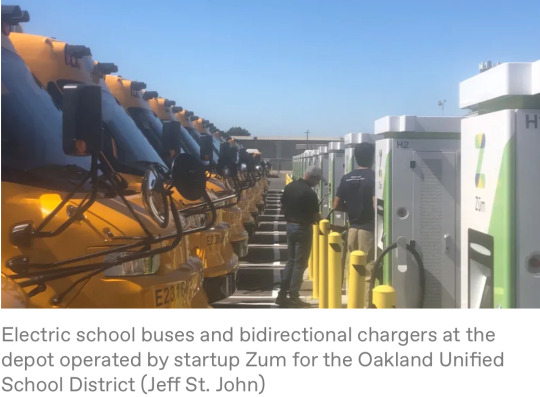
“[The] country’s first all-electric school-bus fleet[,…] which serve the district’s special-needs students, […] can charge with low-cost power and discharge spare capacity at times of grid stress[…. V]ehicle-to-grid charging is something for which electric school buses are particularly well suited.”
10. The Push to Save Horseshoe Crabs Is Gaining Momentum
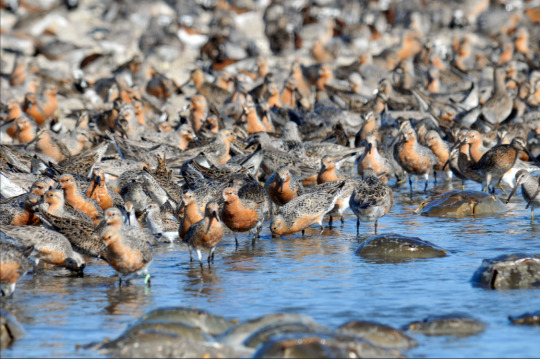
“Conservationists hope new restrictions on harvesting and synthetic alternatives to a crab-blood compound used in biomedical testing can turn the tide for the ancient arthropods, whose eggs are a vital food source for Red Knots [threatened migratory birds]. […] Now conservationists are in the thick of a multi-pronged push to save both species.”
August 22-28 news here | (all credit for images and written material can be found at the source linked; I don’t claim credit for anything but curating.)
#hopepunk#good news#dog#foster dog#animal shelters#dogs#air conditioning#energy efficiency#native#arizona#voting#politics#coral#conservation#wind energy#wind farm#delaware#trout#fish#apache#police#police accountability#wombat#australia#school buses#electric vehicles#horseshoe crab#birds#migration#endangered species
21 notes
·
View notes
Text
I’m an Environmentalist. That’s Why I Can’t Vote Green.
Award-winning filmmaker and director of Gasland Josh Fox on why he will never vote for Jill Stein.
November 1, 2024
The Nation
Milanville, Pennsylvania—Progressives can truly win in this election, even though we have a moderate Democrat on the ticket. And it’s not by voting for Jill Stein. But first, a little history…
Not long ago the entire upper Delaware River basin in Pennsylvania—one of the most beautiful areas in the country, in the watershed for New York City, southern New Jersey and Philadelphia—was on the chopping block for fracking.
A 75 mile stretch of the Delaware River could have become a toxic oil field. Fracking is an environmental apocalypse: millions of gallons of toxic fracking fluids, radioactive waste, underground water contamination, hundreds of thousands of truck trips, air pollution, land scarring, massive public health crises, and depleted water supply. Everything about the practice is toxic; it is inherently contaminating in the long and short term.
Our community was quick to understand the threat and organize and mobilize against it. Every little town along the Delaware across New York and Pennsylvania had a mom-and-pop anti-fracking group spring up. My film Gasland, on HBO, was part of this campaign, and our Gasland tours went from town to town, Johnny Appleseed–style, fostering our new movement.
Amazingly, we won. We banned fracking in the Delaware River basin and in New York State, saving the water supply for 16 million people. One of the greatest achievements of the environmental movement in this century.
We did this by convincing the Democratic governors of New York and Delaware and the president at the time—Barack Obama—to ban fracking here. These were all moderate Democrats. Not exactly Bernie Sanders, if you know what I mean.
I consider myself far to the left of Andrew Cuomo and Barack Obama. But I know that if those moderate Democrats hadn’t been in office, there’s no way we would have won.
Republicans would have just said no. This whole place would have been completely fracked to hell. We would have lost. And the whole gorgeous, life-giving national treasure of the Delaware River would have been a toxic fracking zone.
Our victory against fracking kept more carbon and methane in the ground than almost any other single environmental win in history—making it a huge win for the climate as well.
Here is the key point: I’m not in love with Kamala Harris’s positions on fracking. I find it utterly infuriating when moderate Democrats think that they need to pay lip service to a toxic destructive climate monster of an industry to win Pennsylvania. I don’t actually think that is true, because studies have shown that 70 percent of Pennsylvania residents want fracking either banned or much more tightly regulated.
But I don’t need to be in love. I need to be able to vote strategically.
Hundreds of thousands of people showed up to protect this place and to hold moderate Democrats accountable, and that was the key to victory here.
You know who didn’t show up for this place? Jill Stein. She doesn’t show up for these frontline battles. Ever.
Stein says she’s against fracking, but Stein has hundreds of thousands of dollars invested in the oil and gas industry. Did you know that? Did you know that she actually profits off of the oil and gas industry, that she has had investments in the Keystone XL pipeline and multiple fracking companies?
Did you know that she has investments in Raytheon, that she’s had investments in ExxonMobil? Did you know that she has investments in Home Depot—one of the most rapacious companies in the world, guilty of horrific deforestation throughout the world?
How is it that the Green Party candidate hasn’t divested her own personal fortune from fossil fuels? It’s sheer hypocrisy. And so is the strategy of running for president every four years but never showing up for battles like this.
In 2016, Stein defended these investments by saying they are mutual funds and indexed retirement funds.
But that, plainly speaking, is bunk.
Her claims are a slap in the face to the entire fossil fuel divestment movement. It is easier now than ever to have investments that are fossil free; doing so is a huge plank of the environmental cause. Hundreds of real activists were arrested this summer in New York City calling for Citibank to divest as part of the Summer of Heat campaign. For Stein to ignore all this and still attempt to call herself an activist is beyond hypocrisy, it is political malpractice. Shame on you, Dr. Stein! Shame on you for profiting from fracking and oil drilling.
I’m not in love with Kamala Harris’s positions—on fracking, and on some other issues. But I will tell you what I am in love with. I’m in love with our movements.
I’m in love with what we can do. The entire history of progressive progress in this country is of movements pushing moderate presidents. It happened with FDR and the labor movement. It happened with LBJ and the MLK and the civil rights movement. It happened with Obama and Biden and the movement for gay marriage. We organize and push them—and that’s how we get what we want. That’s our progressive history in America.
But in order for us progressives to do our jobs and fight effectively for a more just and equitable world as a movement, we need to have Harris in office. If we have Donald Trump in office, there’s no chance in hell that we’re actually going to advance an environmental agenda.
So I urge you to please believe in us as a movement. Love us. Believe in our power. We have done this before—and we can do it again with a moderate Democrat in office. Which is the only choice we’ve got right now.
If everyone in who voted for Stein in Pennsylvania, Wisconsin, and Michigan had voted for the Democrat instead, Trump would never have been the president.
We have the true power. It comes from the bottom up.
And I believe in us.
A vote for Harris is a vote for us, a vote for our movements to have a fighting chance for change. Progressive politics and advancing our agenda in this country is not something that happens every four years when you vote, or every four years when a toxic egomaniac like Stein (or Trump, for that matter) runs for president. It is a daily commitment. So vote for Kamala Harris. Join the movement—and I’ll see you on the front lines.
#jill stein#green party#election 2024#us politics#us elections#kamala harris#harris for president#vote democrat
17 notes
·
View notes
Text
If you don't already follow bplant.org, I highly recommend it! It's a great database to see which species are native in your area, and they're doing really incredible work.
Here are some highlights from the article:
---
How has the ornamental plant industry caused harm?
An overwhelming majority of the worst invasive plants in North America were intentionally introduced as landscaping plants. Our analysis of the 96 species on the Delaware Invasive Species Council's Invasive Plant List found that 67 of them, about 70%, originated as ornamental or landscaping plants, and only 7 of these ornamentals also had other uses such as food or fodder. Ornamentals (70%) are a much greater source of invasive introduction than other sources, such as accidental introduction (22%), food plants (11%), or other intentional uses (7%). (These figures add to more than 100% because some plants had multiple paths of introduction.)
[...]
The breeding likely contributed to these plants' invasiveness. The horticulture industry tends to select for traits such as climate hardiness, insect resistance, ease of propagation, and ability to survive in a range of conditions with little care. The selection for insect resistance increases the likelihood both that a plant will have a competitive advantage in the wild, and that it will lead to food web collapse if it does become invasive. The other traits contribute to invasiveness by increasing a plant's fitness in a new region.
Furthermore, when developing cultivars, horticulturalists often cross-breed plants from different sources throughout the plant's native range in order to access a greater pool of genetic diversity to work with. This process alone often increases the plant's vigor and thus its potential to become invasive.
[...]
Horticulture develops, promote, and sells plants with little to no regard for the unique habitat preferences of particular plants.
[...]
Not only does this phenomenon lead to stunted plants, it drives a lot of resource usage as people pour money and effort into irrigation, soil enrichment, or even importing new soil. In the West, such wasteful water usage worsens already-severe problems like depleted aquifers or the fact that the U.S. has used up nearly all the water in the Colorado River before it reaches its delta, which has devastated the delta's ecosystems and also devastated the fishing industry in the Gulf of California. Stressed plants growing on unsuitable sites can also create costly accidents, especially with trees, which can fall on buildings, vehicles, or even injure people.
[...]
Many of these lineages have been isolated from wild populations for generations now, and selected for traits such as insect resistance and propagation in a nursery setting. Even Mt. Cuba Center, often hailed as a leader in the native plant movement, suffers from this approach. Although Mt. Cuba makes sure their plants provide value to the food web through functioning as insect food, their trial garden still tests plants only in a typical garden setting, meaning a mulch bed in more-or-less mesic conditions (moist and well-drained.) Plants adapted to other conditions are given a lower score if they perform poorly in test plots, even if they thrive in the more naturalistic gardens elsewhere on the grounds. Plant breeders are often selecting for similar characteristics, and thus may breed out the traits that make plants adapted to their unique habitat in the wild. When people buy and plant nursery-grown plants, whether in their yards or gardens, or in ecological restoration projects, they are adding genetics which have three features:
The source population(s) are unknown.
Multiple source populations, perhaps far apart, may have been interbred to produce the line.
The plants have been selected, often over many generations, for horticultural attributes.
[...]
What can you do to encourage the necessary change?
If you are only a customer of the nursery industry, whether as an individual, or a large-scale buyer, probably the most important thing you can do to stop buying into nurseries that are far from following best practices on these matters. Do not buy any non-native ornamental plants. If you have not already done so, sign and share the petition to stop Home Depot from selling invasive plants, and support state-level efforts to restrict or ban the sale of invasive plants.
I would go farther, however, and recommend to avoid purchasing any plants that are not derived from local, wild populations. The nursery industry is not going to change just because a minority of people tell them to; they will change when the economics force them to. When you buy plants, even native plants, whose origins are unknown, you support the status quo. And the status quo is a lose-lose. The wholesale nursery industry mass-produces plants of unknown origin, mass-markets them, and most of them get shipped over long distances only to get sold mostly at box retailers where the jobs selling them are low-skill and low-pay. The plants themselves are often unhealthy, and can sometimes pose ecological problems when planted.
---
The article is very in-depth, and even discusses alternate business models for nurseries that could help to address these issues.
12 notes
·
View notes